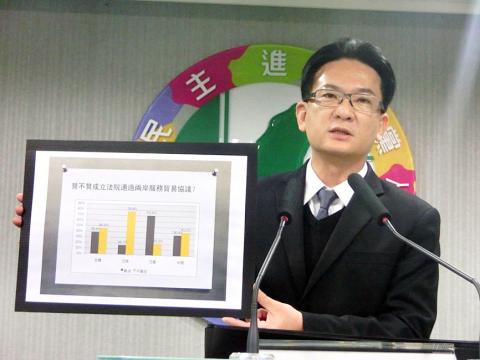|
Majority supports
renegotiation of trade pact: DPP
TRANSPARENCY ISSUE: Respondents were unsure
about China¡¦s intention to uphold the requirements of the trade agreement, the
DPP survey showed
By Chris Wang / Staff reporter

Democratic Progressive Party
spokesperson Lin Chun-hsien in Taipei yesterday shows the results of an opinion
survey about the cross-strait trade in services agreement.
Photo: Lee Hsin-fang, Taipei Times
The majority of respondents in a opinion
poll support the renegotiation of the cross-strait service trade agreement and
view the handling of the pact by President Ma Ying-jeou¡¦s (°¨^¤E) administration
as ¡§undemocratic,¡¨ the Democratic Progressive Party (DPP) said yesterday.
¡§The survey results showed that transparency has been the most serious concern
to arise from cross-strait engagement. If this administration does not change
the opaque way in which it handles cross-strait affairs and continues to view
cross-strait interactions as party-to-party relations, public discontent will
continue,¡¨ DPP spokesperson Lin Chun-hsien (ªL«T¾Ë) told a news conference.
The survey, conducted by the DPP¡¦s poll center, found that 61.5 percent of
respondents supported the renegotiation of the agreement and 62.5 percent
opposed the passage of the pact without at least altering some of its content.
Less than one-third of those polled said that renegotiation is not required
(26.7 percent) and 28.6 percent said the deal should be passed with its content
unchanged.
A total of 58.2 percent of respondents said they were aware that the agreement
is awaiting deliberation in the Legislative Yuan and almost the same percentage
of the respondents, 61.1 percent, argued that the Ma administration had failed
to uphold democratic principles by only screening the agreement in the
legislature.
The respondents¡¦ opinions on whether the pact should be passed and whether it
would have a positive impact appeared to be split, as 38.8 percent supported the
agreement¡¦s passage and 46 percent opposed it, while 39.9 percent believed the
deal would benefit the nation and 49.3 percent said it would harm that the
economy.
Respondents seemed to be skeptical about Beijing¡¦s sincerity in upholding the
requirements of the trade agreement, with 59.3 percent of the respondents saying
that China would not abide by the trade regulations and 30.9 percent saying it
would.
More than half of those polled, 54.7 percent, said they had a good understanding
of the agreement, which is designed to liberalize investment and the flow of
personnel in specific service sectors, Lin said, but 45.3 percent said they did
not know much about the trade deal.
The poll, conducted on Thursday and Friday, collected 960 valid samples and had
a margin of error of 3.2 percentage points.
The proposed agreement has been stalled since it was signed by Taiwanese and
Chinese government representatives in June, as the Legislative Yuan continues to
organize public hearings and seek a consensus on the agreement.
The transparency of the service trade agreement has been questioned by the
opposition, while some industry groups have voiced concern over the pact¡¦s
potential negative repercussions on domestic businesses.
Additional reporting by staff writer
|
![]()
![]()
![]()